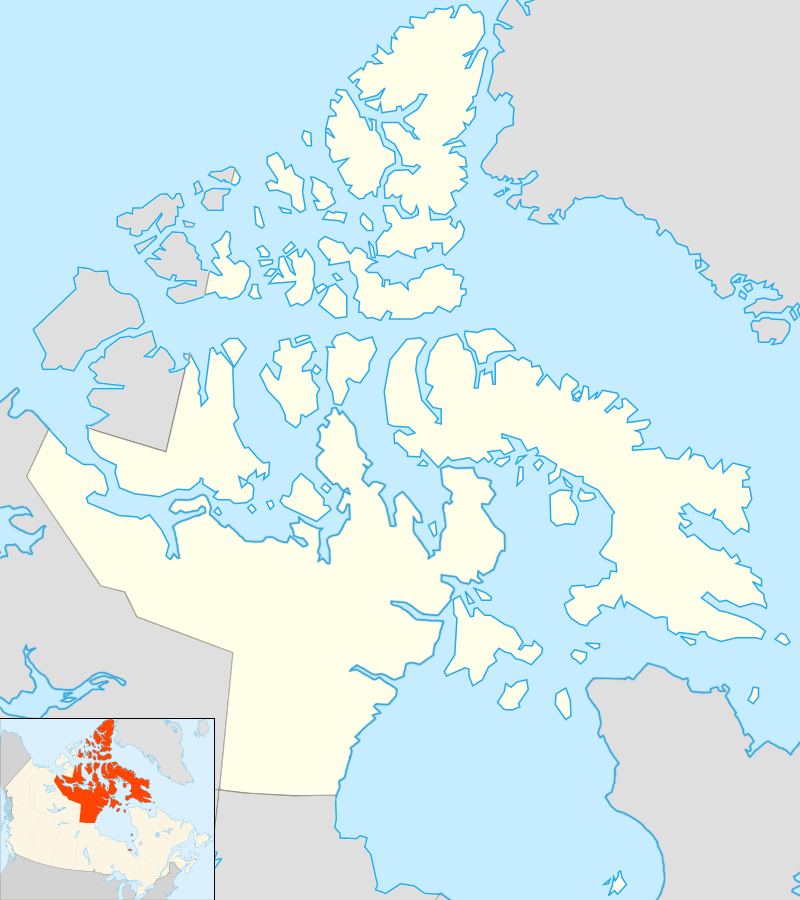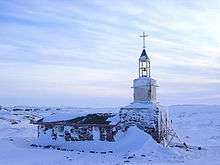Kugaaruk
| Kugaaruk ᑰᒑᕐᔪᒃ | |
|---|---|
| Hamlet | |
|
Overlooking the community | |
 Kugaaruk | |
| Coordinates: 68°31′59″N 089°49′36″W / 68.53306°N 89.82667°WCoordinates: 68°31′59″N 089°49′36″W / 68.53306°N 89.82667°W | |
| Country | Canada |
| Territory | Nunavut |
| Region | Kitikmeot Region |
| Electoral district | Netsilik |
| Catholic mission | 1937 |
| Government[1][2] | |
| • Mayor | Stephen Inaksajak |
| • MLA | Emilino Qirngnuq |
| Area[3] | |
| • Total | 4.97 km2 (1.92 sq mi) |
| Elevation[4] | 17 m (56 ft) |
| Population (2011)[3] | |
| • Total | 771 |
| • Density | 160/km2 (400/sq mi) |
| Time zone | EST (UTC-7) |
| • Summer (DST) | MDT (UTC-6) |
| Canadian Postal code | X0B 1K0 |
| Area code(s) | 867 |
Kugaaruk (Inuktitut syllabics: ᑰᒑᕐᔪᒃ[5][6] Kuugaarjuk or ᑰᒑᕐᕈᒃ Kuugaarruk; English: "little stream") (also called Arviligjuaq, meaning "the great bowhead whale habitat") formerly known as Pelly Bay until 3 December 1999[5] is located on the shore of Pelly Bay, just off the Gulf of Boothia, Simpson Peninsula, Kitikmeot, in Canada's Nunavut territory. Access is by air by the Kugaaruk Airport and by annual supply sealift. Kugaaruk means "little stream",[7] the traditional name of the brook that flows through the hamlet.
As of the 2011 census, the population was 771, an increase of 12.1% from the 2006 census.[3]
Near the hamlet is CAM-4, a North Warning System site that was once part of the Distant Early Warning Line.
Culture

The historical inhabitants were Arviligjuarmiut.(Bennett, 2004, chapter 26, pg. 360) Kugaaruk is a traditional "Central Inuit" community. Until 1968, the people followed a nomadic lifestyle. The population is approximately 97% Inuit and most people self-identify as Netsilik Inuit. The residents blend a land based lifestyle with modern technology and interests. Most families supplement their diet with ringed seal, caribou, and Arctic char. Other game includes narwhal, polar bear, wolverine and muskox. Despite the isolation of the community, the Inuktitut language is declining. Most people 30 and over speak Inuktitut as their first language, but the language is not being passed on to their children. In most households, a mixture of English and Inuktitut is spoken. Children understand their parents and grandparents, but respond to them in English. One goal of the Nunavut educational system is to encourage and spread the use of Inuktitut.
There are a few Inuit artists in Kugaaruk, including the world-renowned Emily Illuitok,[8] who works mostly in walrus ivory and bone and Nick Sikkuark who works are mainly in whale bone, caribou antler, and walrus ivory, and are characterized by "droll, macabre wit".[9] Most women sew traditional parkas, amautiit (baby carrying parkas), and kamik (seal or caribou skin boots).
Kugaardjuq School
Kugaardjuq School is a kindergarten to grade 12 school and is the current host site of the Nunavut Teachers Education Program (NTEP) in the Kitikmeot Region. The school is very modern and includes a large south facing library, computer lab, gymnasium and science lab. Currently there are two language specialists who teach the Nattilingmiut dialect, while the rest of the staff is southern teachers. In 2010 many of the NTEP graduates, who are locals, will become teachers in levels from kindergarten to grade 7. As the only outsiders in the community are government workers, the student population is almost entirely Inuit.[10][11]
All high schools in Nunavut use the Alberta educational curriculum. However, one challenge faced by educators in this community is that most students read at about 3 or 4 grade levels lower than their Albertan counterparts (as of 2007). As with most schools in Nunavut, the school is under the partial authority of the locally elected District Education Authority (DEA) who design policy as well as make decisions regarding discipline, spending, and cultural activities.
Kugaaruk was involved in the Mississauga YMCA exchange in 2007. 15 children from Kugaaruk made their way to Mississauga with three teachers for 7 days. Then, 15 people from Mississauga traveled to Kugaaruk for 11 days to experience the land and culture. Sites visited in Ontario included the CN Tower, the Hockey Hall of Fame, Queen's Park, Square One Shopping Centre, MuchMusic, Niagara Falls, Great Wolf Lodge, and the two exchange schools: Clarkson Secondary, and Hillside Senior Public School.
Climate
Kugaaruk is the location of the coldest wind chill ever recorded in Canada of −92 °C (−134 °F)[12][13] on January 13, 1975, based on an air temperature of −51 °C (−60 °F) and a wind speed of 56 km/h (35 mph).[14][15]
| Climate data for Kugaaruk Airport | |||||||||||||
|---|---|---|---|---|---|---|---|---|---|---|---|---|---|
| Month | Jan | Feb | Mar | Apr | May | Jun | Jul | Aug | Sep | Oct | Nov | Dec | Year |
| Record high humidex | −6.7 | −9.9 | −3.5 | 1.3 | 5.4 | 25.3 | 31.2 | 25.7 | 18.4 | 6.0 | −0.7 | −1.5 | 31.2 |
| Record high °C (°F) | −7.0 (19.4) |
−10.0 (14) |
−3.5 (25.7) |
1.8 (35.2) |
7.5 (45.5) |
26.0 (78.8) |
27.5 (81.5) |
29.0 (84.2) |
18.5 (65.3) |
8.0 (46.4) |
0.0 (32) |
−2.5 (27.5) |
29.0 (84.2) |
| Average high °C (°F) | −29.9 (−21.8) |
−29.6 (−21.3) |
−24.0 (−11.2) |
−14.3 (6.3) |
−4.0 (24.8) |
6.1 (43) |
13.9 (57) |
10.1 (50.2) |
2.7 (36.9) |
−6.0 (21.2) |
−17.4 (0.7) |
−24.6 (−12.3) |
−9.7 (14.5) |
| Daily mean °C (°F) | −33.5 (−28.3) |
−33.5 (−28.3) |
−28.5 (−19.3) |
−19.4 (−2.9) |
−7.9 (17.8) |
2.9 (37.2) |
9.3 (48.7) |
6.5 (43.7) |
0.4 (32.7) |
−9.1 (15.6) |
−21.1 (−6) |
−28.3 (−18.9) |
−13.5 (7.7) |
| Average low °C (°F) | −37.1 (−34.8) |
−37.3 (−35.1) |
−33.0 (−27.4) |
−24.5 (−12.1) |
−11.7 (10.9) |
−0.4 (31.3) |
4.6 (40.3) |
2.9 (37.2) |
−2.0 (28.4) |
−12.1 (10.2) |
−24.9 (−12.8) |
−32.0 (−25.6) |
−17.3 (0.9) |
| Record low °C (°F) | −51.5 (−60.7) |
−49.5 (−57.1) |
−51.0 (−59.8) |
−44.5 (−48.1) |
−32.0 (−25.6) |
−15.2 (4.6) |
−1.5 (29.3) |
−5.0 (23) |
−14.0 (6.8) |
−31.0 (−23.8) |
−40.5 (−40.9) |
−48.5 (−55.3) |
−51.5 (−60.7) |
| Record low wind chill | −93 | −68.2 | −61.8 | −51.4 | −35.1 | −22.7 | 0.0 | −8.9 | −19.8 | −44.3 | −51.7 | −60.2 | −68.2 |
| Average precipitation mm (inches) | 9.0 (0.354) |
8.1 (0.319) |
14.1 (0.555) |
20.0 (0.787) |
18.6 (0.732) |
22.1 (0.87) |
36.5 (1.437) |
44.8 (1.764) |
28.7 (1.13) |
28.4 (1.118) |
17.7 (0.697) |
13.5 (0.531) |
261.3 (10.287) |
| Average rainfall mm (inches) | 0.0 (0) |
0.0 (0) |
0.0 (0) |
0.0 (0) |
1.1 (0.043) |
18.1 (0.713) |
36.5 (1.437) |
43.1 (1.697) |
15.2 (0.598) |
2.6 (0.102) |
0.0 (0) |
0.0 (0) |
116.6 (4.591) |
| Average snowfall cm (inches) | 9.0 (3.54) |
8.1 (3.19) |
14.1 (5.55) |
20.1 (7.91) |
17.7 (6.97) |
4.1 (1.61) |
0.0 (0) |
1.6 (0.63) |
13.6 (5.35) |
26.0 (10.24) |
18.4 (7.24) |
13.5 (5.31) |
146.2 (57.56) |
| Average precipitation days (≥ 0.2 mm) | 6.6 | 5.0 | 6.9 | 6.7 | 8.1 | 7.2 | 9.6 | 13.1 | 12.5 | 12.8 | 9.2 | 7.2 | 104.8 |
| Average rainy days (≥ 0.2 mm) | 0.0 | 0.0 | 0.0 | 0.0 | 0.6 | 5.9 | 9.6 | 12.8 | 6.5 | 0.6 | 0.0 | 0.0 | 36.0 |
| Average snowy days (≥ 0.2 cm) | 6.6 | 5.0 | 6.9 | 6.7 | 7.8 | 1.8 | 0.1 | 0.7 | 7.0 | 12.6 | 9.4 | 7.3 | 71.8 |
| Average relative humidity (%) | 72.7 | 78.1 | 73.2 | 80.8 | 82.9 | 77.3 | 66.4 | 72.0 | 81.2 | 85.0 | 79.0 | 78.4 | 77.2 |
| Source: Environment Canada Canadian Climate Normals 1981–2010[16] | |||||||||||||
See also
References
- ↑ Nunavummiut vie for council positions in upcoming hamlet elections
- ↑ Election Results 2013 General Election at Elections Nunavut
- 1 2 3 2011 census
- ↑ Elevation at airport. Canada Flight Supplement. Effective 0901Z 15 September 2016 to 0901Z 10 November 2016
- 1 2 Kugaaruk at Nunavut Tourism
- ↑ John Ningark MLA for Kugaaruk, syllabics, English
- ↑ ""Kugaaruk" in The Canadian Encyclopedia". Retrieved 2006-10-07.
- ↑ Nunavut News North: January 22nd 2007
- ↑ Hessel, Ingo (2002). Inuit Art: an Introduction. Vancouver: Douglas and McIntyre. p. 119. ISBN 1-55054-829-8.
- ↑ Kugaardjuq School at the Kitikmeot Schools Operations
- ↑ Kugaardjuq School (outdated)
- ↑ The science of wind chill, CBC News, Jan. 14, 2009
- ↑ Elaine Wheaton, But it's a dry cold! (Fifth House Publishers, 1998) p48
- ↑ Christopher C. Burt and Mark Stroud, Extreme Weather: A Guide & Record Book (W. W. Norton & Company, 2007) p58
- ↑ Canada’s Wind Chill Index
- ↑ "Kugaaruk A". Canadian Climate Normals 1981–2010. Environment Canada. Climate ID: 2303092. Retrieved 2014-04-30.
Sources
- Bennett, John, and Susan Diana Mary Rowley. Uqalurait An Oral History of Nunavut. McGill-Queen's native and northern series, 36. Montreal: MQUP, 2004. ISBN 0-7735-2340-5
External links
| Wikimedia Commons has media related to Kugaaruk. |
